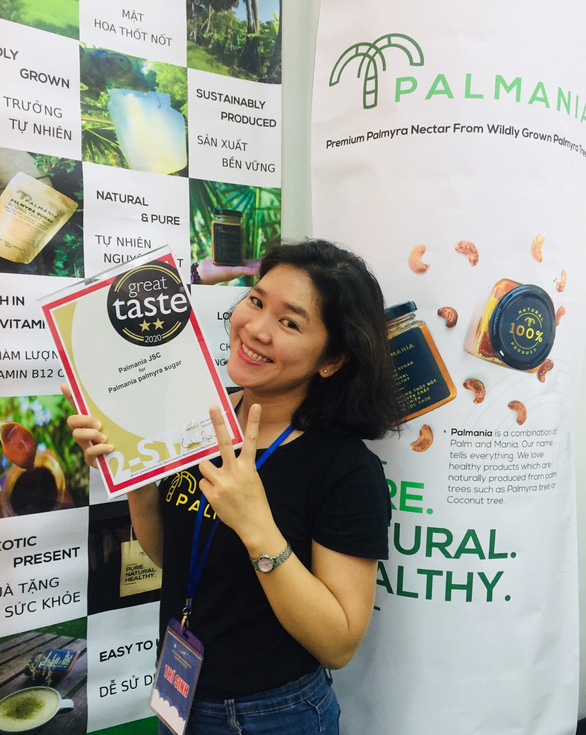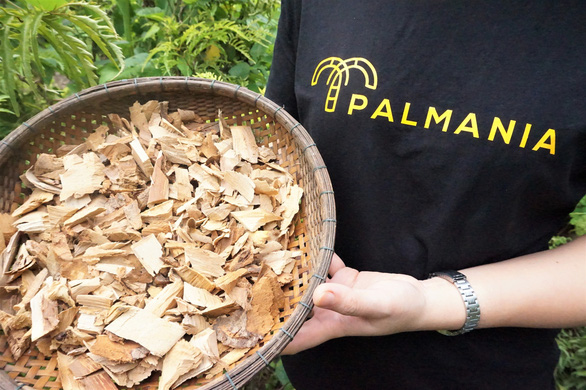Bidding farewell to her dream jobs after more than ten years working in the banking and community welfare service sectors, Chau Ngoc Diu gambled her savings and efforts on developing her hometown’s hallmark palm nectar industry, which has struck a chord at home and abroad.
The 39-year-old woman, of Khmer ethnic minority in Tri Ton District in the Mekong Delta province of An Giang, feels deeply that she has to leverage her community’s long-standing trade of making palmyra palm (thnot, Borassus) sugar and help lift local farmers out of poverty.
“The mild sweetness of palm sugar from the good old days lingers in my mind till now,” Diu shared, adding the abuse of additives to cut processing time and boost volume has made the sugar much harder to come by in Vietnam.
It then occurred to her to produce palmyra nectar by capitalizing on the plants that grow in abundance in her hometown.
The daring woman stood her ground firmly as her family members and friends frowned on her plans to quit well-paid jobs for a risky business.
Diu founded Palmania JSC in June 2017 with an aim to develop traditional palmyra nectar production of Khmer ethnic people and turn a local specialty into an international standard product.
Now, her nectar is found in supermarkets and convenience stores all over Vietnam and possibly in other Asian countries and Europe in the time to come.
Diu’s granulated palmyra nectar, branded Palmania, is the world’s third of its kind to win a two-star accolade at Great Taste Awards 2020 held in the U.K..
At the competition, considered the world's largest and most trusted food and drink awards in the fine cuisine world, her product was put to the test with a panel of over 500 experts and earned the highly respected seals of approval.
Sweet success
Diu still remembers growing up beneath the shades of the palm trees and seeing members of her community make palm sugar in the traditional way.
Upset that the nutritious, pleasantly sweet products failed to make their way to supermarkets and convenience stores as they were marred by unattractive packaging and uncontrolled quality, the innovation-minded budding entrepreneur felt compelled to do something to help.
“I want to churn out items which bear our hallmarks and make nice, readily accessible gifts,” Diu shared.
With that in mind, she began experimenting with sugars.
Almost four years later and one trial after another, the woman finally caught on to her work: she was cooking up a wholly natural, pure, and healthier sweetener.
Though her first steps were met with immediate failures, she finally came up in 2017 with Palmania, a pure, unrefined, and tasty palmyra nectar that sets itself apart from its rivals.
According to Diu, Palmania is the combination of ‘pal,' which means palm tree in the Khmer dialect and ‘mania,' or passion.
“Our brand name tells everything. We want our health products to reach far beyond our impoverished neighborhood,” Diu revealed, adding she is really personal about the items she makes.
The nectar is free of preservatives and additives and rich in healthy minerals as the nectar components are not removed.
“With a low content of sugar and being alkaloid, our products are considered a nutrient-rich, healthful sweetener,” Diu noted, adding she believes it is something her clientele appreciates.
The entrepreneur added her workers stick to a stringent production process, including extracting the nectar in the wee hours to keep it from going sour and using sen (mukulungu) wood to minimize fermentation of palm flower juices within eight hours.
No chemicals or additives are used in any phases to retain natural flavor and ensure perfect safety for consumer health.
|
|
| This supplied photo shows chips of sen (mukulungu) wood, used to minimize fermentation of palmyra flower juices in the traditional sugar production method. |
No regrets
Developing nectar from the abundant supply of palmyra trees in her hometown seemed a natural move, but getting her business off the ground was not easy.
Before quitting her job as the department head at a community welfare organization, the daring woman, who had also worked for 10 years in the banking sector, spent two years monitoring her nectar business remotely from Ho Chi Minh City, where she was working her day job.
With her gaze fixed on developing the healthy products and seeing that the items were becoming popular, Diu quit her job in the southern metropolis altogether in 2019 and focused solely on her business.
After meticulously weighing the pros and cons of such a career move, she bravely entered the business world, ready for the challenges it would bring.
“I was at a crossroads then, but if I didn’t leave my day job, I wouldn’t be able to keep an eye on the production phases and wouldn’t have time for new products,” Diu recalled.
“It’s worth it as for how far I’ve gone."
A major hurdle, Diu shared, is talking local farmers into doing away with their low-tech, unclean production.
To encourage the farming households, the entrepreneur provided them with tools and offered high prices for their finished products.
“The challenge is getting local farmers to see the benefits of clean production,” Diu said, adding it took one whole year to perfect the procedures including ingredient procurement, transport, and processing.
Among the households is Nguyen Van Luom, from Tinh Bien District in the same province, who owns around 50 palm trees aged 25 years and above.
His daily routines now are sterilizing, collecting, and processing nectar in compliance with Diu’s standards.
“It is really tough producing sugar in the method formulated by Diu. I have to steer clear from additives in all phases,” Luom said.
“I also have to refrain from using cleansers and granulated sugar, so it takes much longer to get the nectar.”
Luom said he was on the verge of giving up after some time but has stuck to the method since thanks to Diu’s encouragement and the much higher prices she offered compared to current market rates.
Another disadvantage, according to Diu, is that hers is a process that could prove difficult to scale.
The costs are high too, something Diu said is unavoidable, as one cannot provide healthy treats without additional costs.
Going the traditional way, it takes only four to five hours to get 100 kilograms of sugar as a finished product.
With Diu’s method, an eight-hour production yields only 20-30 kilograms.
“My products boast a really different taste and high nutritional value while retaining the very essence of nectar,” she proudly said.
Diu’s currently two main product lines, soft palmyra nectar and granulated palmyra nectar, have hit shelves at supermarkets and convenience stores across the country.
She is working to export her fine quality products to Japan and Europe, hoping to meet the benchmarks of these choosy markets.
These days, Diu is translating readings from foreign sources to make modifications to her machinery and production procedures.
Regarding her future plans, she said she will work hard to come up with new product lines from palmyra nectar.
National recognition
Chau Ngoc Diu’s products have won numerous prizes at provincial and national competitions.
In 2020, her soft palmyra nectar was recognized with four-star OCOP (One Commune One Product) by the An Giang People’s Committee to encourage entrepreneurs’ efforts in tapping into local specialties.
Her two mainstay better-for-you products both received Tri Ton District’s recognition conferred on agricultural products the same year.
The enterprising woman has also pocketed numerous prizes at business idea and startup competitions across the Mekong Delta.
Like us on Facebook or follow us on Twitter to get the latest news about Vietnam!



















































